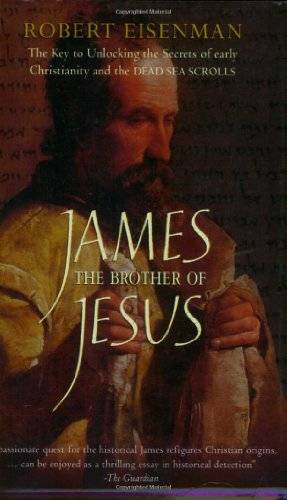James the Brother of Jesus: The Key to Unlocking the Secrets of Early Christianity and the Dead Sea Scrolls.
Published by Watkins, 2002, softcover, illustrated, index, 1073 pages, condition: as new.
James was a vegetarian, wore linen clothing, bathed daily at dawn in cold water and was a lifelong Nazirite. In this work of scholarly detection, biblical scholar Robert Eisenman introduces a theory about the identity of James, Jesus' brother, who was almost entirely marginalized in the New Testament. Drawing on early Church texts and the Dead Sea Scrolls, he reveals in this groundbreaking exploration that James, not Peter, was the real successor to the movement now called "Christianity." In an argument with enormous implications, he identifies Paul as compromised by Roman contacts. James is presented as not simply the leader of the Christianity of his day, but a popular Jewish leader, whose death triggered the uprising against Romea fact that creative rewriting of early Church documents has obscured. Eisenman reveals that characters such as "Judas Iscariot" and "the Apostle James" didn't exist as such. In delineating the deliberate falsifications in New Testament documents, he shows how James was written while anti-Semitism was written in. By rescuing James from oblivion, the final conclusion of James the Brother of Jesus is, in the words of The Jerusalem Post, "apocalyptic". Who and whatever James was, so was Jesus.
"Every once in a while a book comes along that offers a complete paradigm shift and really makes you stop and think. This is such a book. As a piece of literature it is probably 4 stars because it does get tediously repetitive and dwells on a subject for a very long time, but this is somewhat necessary to connect all of the dots. The ideas presented more than make up for this, though. The book tires to discover the historical Jesus by discovering the historical James, Jesus' brother and the leader of the Jerusalem Church. The book demonstrates how many accounts in the book of Acts fly right in the face of the historical data of the time. Eisenman connects James' community to the community at Qumran. At first, I was skeptical, but his research has convinced me to read the Dead Sea scrolls in a new light. Essentially, he claims some of the Dead Sea Scrolls are arguing directly against the teachings of Paul. As a person trained in history, I appreciated his historical approach to the New Testament. He takes about the various rulers, political affiliations, and Jewish sects in great detail. This book is thick, almost 1,000 pages of text, but well worth it. I was consumed by this book for almost a full month, but it was well worth the time. It has really made me want to go read Josephus and the Dead Sea Scrolls. If you want to try to find the historical Jesus, read this book."

